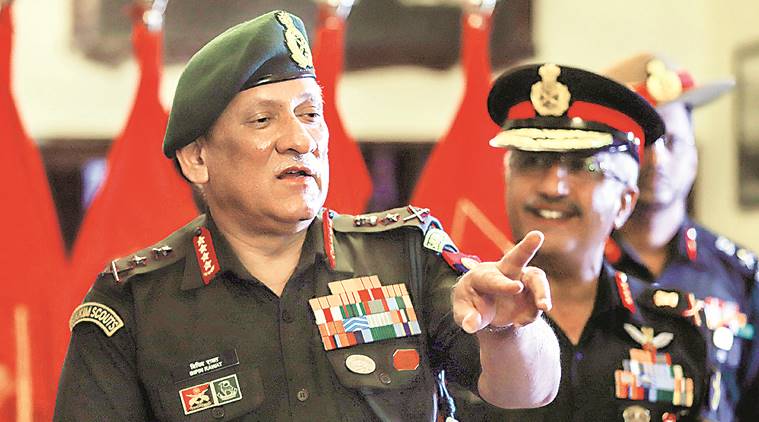As CDS, General Rawat will have to facilitate restructuring of military commands for optimal utilisation of resources by bringing about jointness in operations, including through establishment of joint/ theatre commands.

On Saturday, government had notified that the age of retirement for the CDS will be 65 years; General Rawat will turn 65 in March 2023 — if he continues till then, it will be a tenure of 3 years and 3 months. (PTI Photo)
A day before his retirement as Army Chief, the government Monday appointed General Bipin Rawat as the first Chief of Defence Staff (CDS), a post meant to enhance the quality of military advice to the political leadership through integration of service inputs.
General Rawat will take over the duties of CDS from December 31, his last day in office as Army Chief. The official press release does not specify a time-bound tenure for General Rawat, stating that he will continue “until further orders and extension in service… with effect from 31.12.2019 and till such period he holds the office of CDS”.
On Saturday, government had notified that the age of retirement for the CDS will be 65 years; General Rawat will turn 65 in March 2023 — if he continues till then, it will be a tenure of 3 years and 3 months.
General Rawat, who took over as Army Chief on December 31, 2016 after superseding two officers senior to him, was widely tipped to be the first appointee to the post of CDS after Prime Minister Narendra Modi announced the creation of the post during his Independence Day speech from Red Fort on August 15. He will act as the Principal Military Adviser to the Defence Minister on tri-services matters, but will not exercise any military command, including over the three service chiefs.
READ | CDS: Govt notifies retirement age at 65
On December 24, the Union Cabinet had given sanction to creation of the post of CDS, and his role and charter in the government. He will be an officer of four-star rank at par with the three service chiefs. He would be responsible for achieving “jointness in operation, logistics, transport, training, support services, communications, repairs and maintenance of the three services” within three years of assuming office.
He will head the newly created Department of Military Affairs (DMA) in the Ministry of Defence. Work exclusively pertaining to military matters will fall within the purview of the DMA, while the Department of Defence will deal with larger issues pertaining to defence of the country. The three defence services will fall under the ambit of DMA.
As CDS, General Rawat will have to facilitate restructuring of military commands for optimal utilisation of resources by bringing about jointness in operations, including through establishment of joint/ theatre commands.
As per the Cabinet decision, the CDS will also serve as the permanent chairman of the Chiefs of Staff Committee (COSC) which comprises the three service chiefs. So far, the chairmanship of the COSC has not been permanent and is held in rotation by the most senior service chief, which has caused problems of inadequate attention and short tenures of chairman, COSC.
General Rawat was commissioned in the Gorkha regiment in 1978, after being awarded the Sword of Honour at the Indian Military Academy, Dehradun. He commanded an infantry battalion along the Line of Actual Control with China, and a Rashtriya Rifles sector in Kashmir as a Brigadier. He commanded an infantry division in Kashmir and a corps in Eastern Command, before serving as the Southern Army Commander and the Vice Chief of Army Staff.
His tenure as Army Chief has seen an attempt to modernise the Army’s way of warfighting by bringing in the concept of integrated battle groups for warfare. He has restructured the Army headquarters and made recommendations for reforming and restructuring the Army, which are yet to be fully implemented. He has seen the standoff with Chinese Army at Doklam and a very active Line of Control with Pakistan where ceasefire violations have reached an all-time high.
His tenure also coincided with a period of reduced allocations for Army’s modernisation and a deteriorating security situation in Kashmir. He has also been in controversy a few times after making political statements which have been criticised by Opposition parties.
